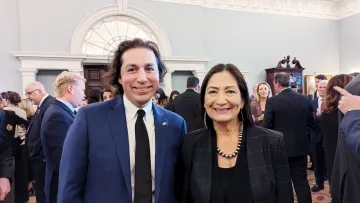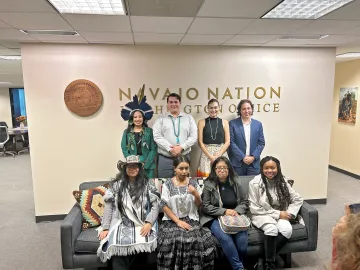Fulbright Brilliance
Two U of A alums are transforming global communities.

Pauline Koelbl (L) and community members.
Photo: provided by Koelbl
After World War II, visionaries saw an opportunity to improve relationships and understanding among countries. Leading this effort was James William Fulbright, a senator from Arkansas who was well known for international relations. As a result, a program bearing his name — the Fulbright — adopted the mission of building mutual understanding between nations.
Now, the program dispatches approximately 9,000 students, teachers, scholars, artists and professionals around the world each year, where they pursue graduate studies, research or teaching. The Fulbright is administered by the U.S. Department of State’s Bureau of Educational and Cultural Affairs and jointly funded by the U.S. and host governments. It’s a distinguished club whose past participants include 62 Nobel Prize recipients, 90 Pulitzer Prize winners and more than 42 current or former heads of government.
This venerable roster also includes more than a few Wildcats. In fact, the University of Arizona has an excellent track record of supporting graduating seniors, alumni, graduate students, faculty and staff in their pursuit of Fulbright opportunities. Last year, a record 17 U of A faculty and staff became Fulbright Scholars. And over the past few decades more than 240 graduating seniors, alumni, and graduate students have won U.S. Student Program Fulbright awards.
Meet two of the scholars who are among this excellent group of U.S. Student Fulbright Program awardees.
Connecting Philanthropy and the Private Sector to Change Lives
Some people are destroyed by tragedy; others glean wisdom from it. Among the latter is Pauline Koelbl ’07, who landed in Tucson as a documented refugee after fleeing the Rwandan genocide, and now runs two organizations aimed at unlocking the potential of African entrepreneurs and innovators while addressing the existing gender funding gap. She believes this is the smart way to tackle poverty on the continent.
“After the genocide, my interest was to learn something that would allow me to go back and address issues around poverty,” she says, “because I was convinced that the experience of Rwanda was linked to poverty.”
The term, she explains, is multifaceted. “There are different levels of poverty. There’s the poverty linked to not having access to opportunities or enough information and the poverty linked to natural resources.”
Koelbl is working hard to address the poverty linked to the lack of access to opportunities Today, she directs two organizations focused on supporting African entrepreneurs and innovators, primarily women. She is the founder and CEO of AfriProspect, a Swiss-based company that connects African innovators with global markets and finds seed money for impact-driven, female-led businesses. She also is the founder and managing partner of Mauritius-based ShEquity, which provides smart and sustainable investments for African female entrepreneurs and innovators.
This calling traces back to her experiences as a double Fulbright scholar — and to the U of A, where she was an international studies major in the W.A. Franke Honors College. “International studies was really a way to go back and connect with my roots,” she says. “My old roots and my new roots. And it helped me find ways to contribute to making the world a better place.”
For Koelbl, the support she received in the international studies program was powerful. “It was built around the students, the regions and issues that they cared about. And it was unique in the way that the director, Wayne Decker, really dedicated his life to the students. When we graduated, we all felt better prepared to utilize our knowledge to impact the world.”
Upon graduating, she garnered a string of awards including the Pillars of Excellence Recognition Program Award, the U of A Centennial Achievement Award and an Honors College Outstanding Senior Award. She was encouraged to apply for the Fulbright, which enabled her to earn a master’s in poverty and development from the prestigious Institute of Development Studies (IDS) at the University of Sussex in the United Kingdom. She went on to work for the United Nations Educational, Scientific and Cultural Organization (UNESCO) under a second Fulbright and completed an executive education program in innovation for economic development from Harvard University’s John F. Kennedy School of Government.
‘International studies was really a way to go back and connect with my roots. My old roots and my new roots. And it helped me find ways to contribute to making the world a better place.’
Her diverse lived experiences give her a perspective that differs from the typical approach of non-governmental organizations, or NGOs, to addressing poverty. “When NGOs talk about alleviating poverty, they tend to focus on treating the symptoms instead of focusing on the root causes of those symptoms,” she says. “New approaches are needed, rather than the typical international development approaches that have been applied over and over and have not yielded satisfactory results in comparison to the allocated resources.”
That new approach involves tackling poverty by creating economic opportunity. “I wanted to focus on supporting African entrepreneurs and innovators, because they are better positioned to create viable solutions to address local challenges. However, they often lack re-sources and support needed to benchmark and scale those solutions. I have networks in different markets, which I can leverage to facilitate access to investment needed while also creating unique opportunities for impact-driven investors to generate triple bottom line re-turn: profit combined with impact on people and the planet.”
That impact is most critical among African women, she says. “They don’t have enough access to financial capital, compared to men, even when they provide equally excellent products and services. In Africa, we’re talking about a $42 billion gender funding gap. It’s glaring. But it’s also a business opportunity.”
Koelbl says she has been working internationally with “amazing people who have the money and inspiration to do things differently.” She set up ShEquity as an impact fund to mobilize smart investments for women-owned and -led businesses in Africa. “It’s not a charity, and it’s not microfinance,” she says.
Instead, she calls investment in women a smart approach to creating prosperity for every-one, because its trickle-down impact includes lifting many families out of poverty. Research shows that women-managed startups deliver at least two and a half times the revenue of those man-aged by men. And it is widely known that women reinvest 90% of their income back into families and communities, compared to 35% by men.
“When engaging with developing markets, people tend to want to bring a handout,” Koelbl says. “But I’m convinced that we need to connect philanthropic funding with private in-vestments to achieve greater impact and really change lives.”
Advocating for Indigenous Peoples Sovereignty
Sometimes, the best perspective on where you’re going comes from where you’ve been. Con-sider Vince Redhouse ’15 ’21, a Wildcat and a member of the Navajo Nation. In 2015, he traveled to Australia as a Fulbright scholarship recipient, where he studied political recon-ciliation between that nation’s Aboriginal people and the government that colonized them.
He came away with the conclusion that true political reconciliation between any Indigenous people and their settler colonial government requires starting from scratch: returning their autonomy and land and letting them decide whether an accord with the government is worthwhile.

Vince Redhouse (R) and international Indigenous youth at the Navajo Nation Washington Office in D.C. Redhouse worked with the State Department to help bring youth to the White House Tribal Youth Forum and then coordinated a visit to the office.
Photo: provided by Redhouse
Redhouse also left Australia convinced that he could best help Indigenous people by becoming a lawyer. Today, he works for a top tribal-focused law firm.
It was while he was studying philosophy, politics, economics and law as an undergrad that advisers in the W.A. Franke Honors College suggested he apply for a Fulbright.
At the time, he says, he didn’t even know what the award was. “But they really helped me identify the type of project that would make sense for me and where it would make sense for me to do it. Having those relationships was absolutely crucial.”
His project, pursued at Australian National University, focused on political reconciliation between Aboriginal peoples and Australia. Aboriginal people — Australia’s first inhabitants — have dwelled on that continent for 65,000 years. But, like North American Indigenous tribes, they were driven from their homelands and treated with hostility by white settlers.
When the British began colonizing Australia in 1788, they brought with them European diseases that raged through the Aboriginal populations. An estimated 20,000 Indigenous people also died in violent clashes with the colonizers. Similar to practices in the United States, many Aboriginal children throughout the 20th century were removed from their homes and sent to grim institutions in attempts to exorcise their cultural heritage. Many were also punished for speaking their native languages.
And discrimination continues today; in 2023, Australian voters soundly defeated a national referendum to include recognition of Aboriginal people in the national constitution and to require that their needs carry weight in parliamentary debate.
The issues, concerns and history of violence struck home for Redhouse, who was invited to political events and met Australian Parliament members and staff working on Indigenous issues.
“I was doing research and talking to those staffers — and just listening to the needs of Indigenous peoples out there and knowing the needs of Indigenous people” in America, he says. “To-ward the end of my Fulbright, I realized that I would be a much more useful advocate for Indigenous peoples if I had legal training.”

Redhouse and U.S. Secretary of the Interior Deb Haaland at a luncheon honoring Australian Prime Minister Anthony Albanese.
Photo: provided by Redhouse
He returned to the U of A, earned a law degree in 2021 and now practices in Washington, D.C., with Hobbs, Straus, Dean & Walker LLP, a law firm devoted to advancing and defending tribal rights.
‘You need to put Indigenous peoples in a position where they can effectively say ‘no’ to reconciling with you. And if you put them in that position, and they nonetheless decide to submit to your authority, then that’s when you can claim you have moral authority — that’s when you can say things are truly reconciled.’
He also has pondered the insights he gained overseas and continues to feel that true political reconciliation between Indigenous peoples and settler colonial states is contingent on acknowledging the right and the ability of Indigenous peoples to decide for themselves how they want to be governed.
For Redhouse, the moral authority to govern can only be earned by returning the lands and full autonomy to the people from whom they were taken, including the choice of how to move forward. Anything less, he says, is the same kind of coercion Indigenous peoples have experienced historically.
“You need to put Indigenous peoples in a position where they can effectively say ‘no’ to reconciling with you. And if you put them in that position, and they nonetheless decide to submit to your authority, then that’s when you can claim you have moral authority — that’s when you can say things are truly reconciled. It’s very hard to put it into practice, but I think the exercise itself is something to strive toward.”
In the meantime, Redhouse is leveraging his award to create a better future for Indigenous peoples. He also has lobbied for a Fulbright exchange program between the U of A and a sister institution in Australia and has become a Fulbright Alumni Ambassador, traveling to conferences, colleges, and universities where he encourages Native American students to apply for the scholarship like he did.
“There’s the need to create a new generation of Indigenous leaders that have the opportunity to lead on a global scale on global issues,” he says. “They can learn from each other about what their respective nations are doing to advance the rights and interests of Indigenous people.”
